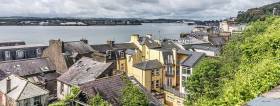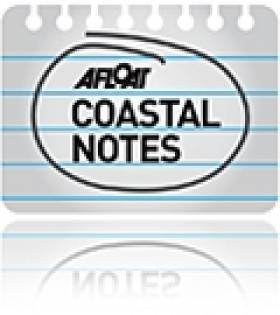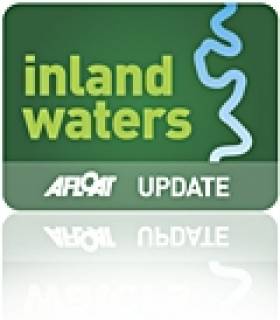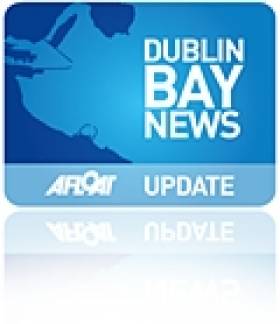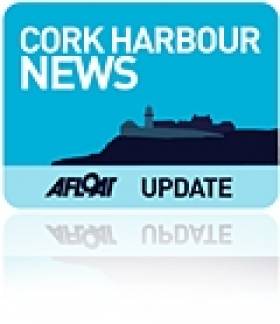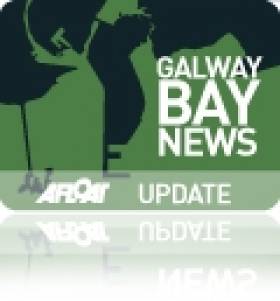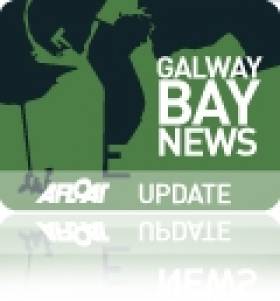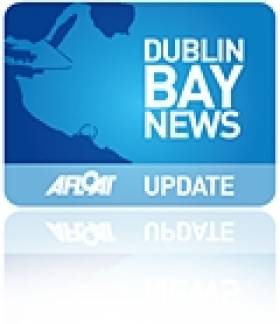Displaying items by tag: sewage
#CorkHarbour - Some 35,000 wheelie bins’ worth of raw sewage is being discharged into Cork Harbour every day, Housing Minister Simon Coveney has told the Dáil.
But as The Irish Times reports, the minister has promised that the problem will be fixed within the next 18 months by Irish Water as part of a €100 million wastewater scheme for the region.
More than three years ago, Afloat.ie reported that untreated waste was flowing into open water from communities around Cork Harbour as they awaited new sewage facilities.
Crosshaven, Carrigaline, Ringaskiddy, Passage West and Cobh were cited among those towns and areas that continue to discharge raw sewage through a number of outflows into the harbour.
“There is a lot to do here,” said Minister Coveney in reference to Cork Harbour as well as other group water schemes throughout the country, which have a funding package signed off by all relevant bodies.
Responding to Dáil questions regarding the financing of Irish Water’s capital programme, the minister said the Government was committed to keeping Irish Water as a single national and publicly owned utility that “can achieve many of the more national strategic goals that need to be attained around water that individual local authorities on their own could not do.”
The Irish Times has more on the story HERE.
#CoastalNotes - Seven large urban coastal areas are among more than 40 towns nationwide still seeing untreated sewage released into the water supply, the Environmental Protection Agency (EPA) warns.
According to RTÉ News, the EPA says the current situation is in breach of an EU directive issued more than two decades ago.
Yet three large towns – Killybegs in Co Donegal, Ringaskiddy on Cork Harbour and Arklow in Co Wicklow - have been waiting some 13 years for secondary wastewater treatment facilities.
Moreover, it's been found that nearly a third of established secondary treatment plants nationwide do not meet the EU's main effluent standards, prompting serious pollution concerns.
Clifden in Co Galway and the Co Cork towns of Youghal, Cobh and Passage West have also been identified among the bigger urban areas still discharging untreated wastewater into coastal waters.
The news comes just weeks after it was discovered that effluent from an entire town in Co Galway is being piped into a Special Area of Conservation.
RTÉ News has more on the story HERE.
Galway Town's Sewage Is Piped Into Conservation Area
#Turlough - TheJournal.ie reports that waste water from a whole town in Co Galway is being piped into a Special Area of Conservation.
According to an investigation by Ireland's national trust An Taisce, sewage from the town of Glenamaddy, home to some 700 residents in the north-east of the county, is being discharged in a local turlough - a lake that appears and disappears as the water table rises and falls - from which is has contaminated a nearby spring.
An Taisce described the town's present sewage unit as "primitive" and said: "It has been a subject of internal discussions within various public authorities for the best part of at least 20 years, yet the hazard continues to this day.”
TheJournal.ie has more on the story HERE.
Supreme Court Clears Way For Ringsend Locals' Sewage Plant Challenge
#DublinBay - The Supreme Court has ruled that residents of Ringsend in Dublin can continue their legal challenge to the expansion of the area's sewage treatment plant, as RTÉ News reports.
The planned €270 million extension is part of the Dublin Bay Project that will see a 9km tunnel constructed to enable the discharge of treated sewage far into Dublin Bay.
At present the wastewater is discharged at Ringsend, in the southern part of Dublin's Docklands.
The Sandymount and Merrion Residents' Association argues that the new pipeline would discharge effluent into the newly designated marine conservation area between Rockabill and Dalkey Island.
The High Court's approval of residents' challenge to the granting of planning permission for the development was appealed by the State and Dublin City Council, but that appeal was rejected by the Surpreme Court today (10 October).
A similar sewage scheme in North Co Dublin has also faced objections from residents throughout the Fingal area.
RTÉ News has more on the story HERE.
#CorkHarbour - Untreated sewage is being discharged from "multiple" locations into Cork Harbour as residents await the development of new waste water treatment works.
As reported by Fine Gael Councillor Deirdre Forde, harbour officials have given confirmation that "there are still multiple untreated discharges to Cork Harbour.
"It is not simply a case of repairing a broken sewer to cease untreated discharges," the spokesperson added.
Waste water from Crosshaven, Carrigaline, Ringaskiddy, Passage West and Cobh, among other areas, is discharged through a number of outflows into the lower harbour - a region earmarked for a new drainage scheme project that's projected to be completed three years from now.
Harbour officials underlined that the level of the water table has no impact on the discharge, and that as the lower harbour is not designated for bathing there are no issues for swimmers.
Clonshaugh Chosen For Fingal Sewage 'Super Plant'
#Sewage - Clonshaugh in North Dublin has been chosen as the location for the city's new water treatment 'super plant' which has long faced objections from local campaigners.
As The Irish Times reports, a meeting of Fingal County Council yesterday afternoon (10 June) saw the site near Dublin Airport chosen over Annsbrook and Newtowncorduff, both near the coastal towns of Rush and Lusk.
Part of the plan includes the construction of a 26km orbital sewer to collect waste from parts of Dublin, Kildare and Meath, and an outfall pipeline that will eject waste near Ireland's Eye.
Project managers have described the Clonshaugh option as "ecologically and environmentally better" than the alternatives, but campaigners such as Reclaim Fingal chair Brian Hosford argue that "the potential for environmental disaster [with a single large plant] is enormous".
In January 2012, Minister for Health James Reilly raised his own concerns that any potential malfunction at the large-scale facility - second-only in scale to the new water treatment plant at Ringsend - could see huge amounts of raw sewage pumped into the Irish Sea.
Meanwhile, The Irish Times also spoke to a farming family who may lose as many as 40 acres if the 'super plant' gets the go-ahead adjacent to their land.
"I would have to change my whole system of farming if this goes ahead," said 77-year-old PJ Jones, who added that his biggest concern was the smell.
#GalwayBay - A Galway City Council official has denied claims that raw sewage from a treatment plant at Mutton Island is being discharged into Galway Bay.
As the Galway Advertiser reports, Ciarán Hayes told a special meeting of the council last Monday 15 April that he "would not like the impression to go out that we would allow sewage to be discharged, it's not".
Hayes was responding to questions from Cllr Catherine Connolly with regard to tenders issued for the upgrading of the treatment plant, which forms part of the Galway Main Drainage Stage 3 and which has been approved for funding from the Department of Environment.
He added that the current system is licences by the Environmental Protection Agency (EPA) and "is in accordance with industry best practice".
Meanwhile, the meeting also discussed a proposed extension of pedestrian access to Mutton Island lighthouse, which as previously reported on Afloat.ie was opened to tour groups last year after extensive refurbishment since 2005.
The Galway Advertiser has more on the story HERE.
Raw Sewage Outfall Concern for Galway Residents
#GALWAY BAY - Galway residents are voicing fears over pollution in Galway Bay due to alleged increase in outfalls from the city's sewage system.
As Galway News reports, locals in the Claddagh area spotted a discharge of raw sewage into the Claddagh Basin in July, which was confirmed by City Councillor Catherine Connolly to be an outfall.
Such releases are triggered automatically, like a safety valve, in emergency circumstances, such as after heavy rainfall which backs up the system.
Cllr Connolly has expressed her concern over an increase in the number of such releases over recent months, and their potential contribution to the degradation of water quality in the area - especially following the temporary closure of Grattan Beach in Salthill last month due to E.coli contamination.
She has also called for a report from the council on the difficulties experiences at the Mutton Island water treatment plant resulting from the inflow of grease and fats into the system from hotels and restaurants.
Galway News has more on the story HERE.
€220m for 9km Pipeline to Cut Dublin Bay Pollution
Dublin City Council is proposing a mammoth 9km sewage outfall pipe to help make Dublin Bay cleaner - at a cost of €220m.
Herald.ie reports that the 5m-wide pipe - longer than the Dublin Port Tunnel - would dump effluent from the Ringsend treatment plant far offshore, thereby avoiding pollution in the bay and sensitive areas such as Bull Island, which recently lost its EU Blue Flag status for Dollymount Strand.
Plans for the project, which DCC head of waste Pat Cronin described as the "greenest and most economic solution" will be open to public consultation in the near future, with a timetable for completion by 2015.
The pipeline and redeveloped treatment plant will be funded via the Department of the Environment's water services investment programme.



























